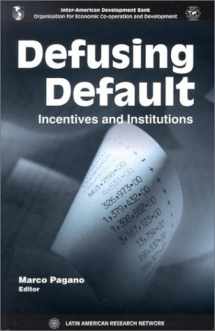
Defusing Default: Incentives and Institutions (Inter-American Development Bank)
ISBN-13:
9781886938984
ISBN-10:
1886938989
Author:
Marco Pagano
Publication date:
2002
Publisher:
Inter-American Development Bank
Format:
Paperback
250 pages
FREE US shipping
on ALL non-marketplace orders
Marketplace
from $7.58
USD
Marketplace offers
Seller
Condition
Note
Seller
Condition
Used - Good
Book details
ISBN-13:
9781886938984
ISBN-10:
1886938989
Author:
Marco Pagano
Publication date:
2002
Publisher:
Inter-American Development Bank
Format:
Paperback
250 pages
Summary
Defusing Default: Incentives and Institutions (Inter-American Development Bank) (ISBN-13: 9781886938984 and ISBN-10: 1886938989), written by authors
Marco Pagano, was published by Inter-American Development Bank in 2002.
With an overall rating of 4.3 stars, it's a notable title among other
books. You can easily purchase or rent Defusing Default: Incentives and Institutions (Inter-American Development Bank) (Paperback) from BooksRun,
along with many other new and used
books
and textbooks.
And, if you're looking to sell your copy, our current buyback offer is $0.6.
Description
How much protection should a country's judicial system afford creditors? The answer has far-reaching implications for the functioning of credit markets, particularly in developing regions such as Latin America, where creditor rights are uneven and enforcement often lax. Defusing Default uses a variety of perspectives and tools, including theoretical modeling and cross-country evidence, to examine the costs and benefits of protecting creditor rights. Case studies look at creditor protection in Argentina, Brazil, Chile, Costa Rica, Paraguay and Peru. The studies find that more effective judicial enforcement would help to make more credit available and improve the overall performance of the credit market. Another finding is that private contracting in credit markets, including information-sharing arrangements, can help compensate for legal deficiencies and create incentives to limit default in countries where judicial enforcement is costly or ineffective. Finally, the book explores the political economy of debt moratoria by examining bailouts and bankruptcy.


We would LOVE it if you could help us and other readers by reviewing the book
Book review

Congratulations! We have received your book review.
{user}
{createdAt}
by {truncated_author}


